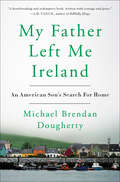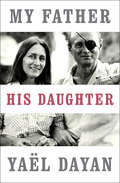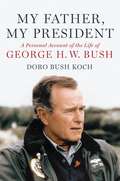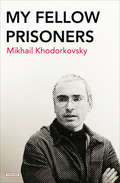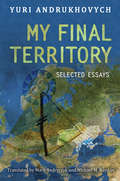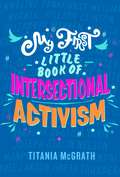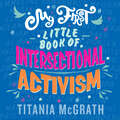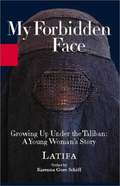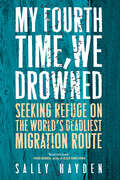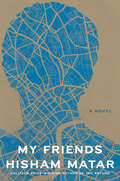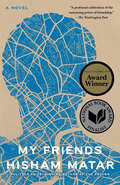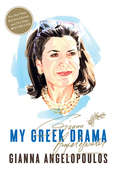- Table View
- List View
My Father Left Me Ireland: An American Son's Search For Home
by Michael Brendan DoughertyNational Review senior writer Michael Brendan Dougherty delivers a meditation on belonging, fatherhood, and nationalism, through a series of letters to his estranged Irish father.The child of an Irish man and an Irish-American woman who split up before he was born, Michael Brendan Dougherty grew up with an acute sense of absence. He was raised in New Jersey by his hard-working single mother, who gave him a passion for Ireland, the land of her roots and the home of Michael's father. She put him to bed using little phrases in the Irish language, sang traditional songs, and filled their home with a romantic vision of a homeland over the horizon. Every few years, his father returned from Dublin for a visit, but those encounters were never long enough. Devastated by his father's departures, Michael eventually consoled himself by believing that fatherhood was best understood as a check in the mail. Wearied by the Irish kitsch of the 1990s, he began to reject his mother's Irish nationalism as a romantic myth.Years later, when Michael found out that he would soon be a father himself, he could no longer afford to be jaded; he would need to tell his daughter who she is and where she comes from. He immediately re-immersed himself in the biographies of firebrands like Patrick Pearse and studied the Irish language. And he decided to reconnect with the man who had left him behind, and the nation just over the horizon. He began writing letters to his father about what he remembered, missed, and longed for. Those letters would become this book.Along the way, Michael realized that his longings were shared by many Americans of every ethnicity and background. So many of us these days lack a clear sense of our cultural origins or even a vocabulary for expressing this lack--so we avoid talking about our roots altogether. As a result, the traditional sense of pride has started to feel foreign and dangerous; we've become great consumers of cultural kitsch, but useless conservators of our true history. In these deeply felt and fascinating letters, Dougherty goes beyond his family's story to share a fascinating meditation on the meaning of identity in America.
My Father at 100
by Ron ReaganFebruary 6, 2011, is the one hundredth anniversary of Ronald Reagan's birth. To mark the occasion, Ron Reagan has written My Father at 100, an intimate look at the life of his father-one of the most popular presidents in American history-told from the perspective of someone who knew Ronald Reagan better than any advisor, friend, or colleague. As he grew up under his father's watchful gaze, he observed the very qualities that made the future president a powerful leader. Yet for all of their shared experiences of horseback rides and touch football games, there was much that Ron never knew about his father's past, and in My Father at 100 he sets out to understand this beloved, if often enigmatic figure who turned his early tribulations into a stunning political career. Since his death in 2004, President Reagan has been a galvanizing force that personifies the values of an older America and represents an important era in national history. Ron Reagan traces the sources of these values in his father's early years and offers a heartfelt portrait of a man and his country-and his personal memories of the president he knew as "Dad. "
My Father's House: An Ode to America's Longest-Serving Black Congressman
by John Conyers IIIIn this moving work, part clear-eyed assessment, part memoir, the son of iconic African American Congressman John Conyers Jr. shines a spotlight on his father and his political legacy, and reveals how, as his son, he eventually learned to leverage his own voice in a world that his father helped create.A respectful, thoughtful, yet clear-eyed reframing of a national hero’s personal and political odyssey, My Father’s House is John Conyers III's love letter to his father and a record of his own journey. Conyers reveals a towering figure in modern American political history and an ordinary family man; a leader whose work in Washington necessitated his many absences as a father from a son coming of age in Detroit.John Conyers III introduces us to John James Conyers, Jr. the legislator, who changed lives and made history, and of his equity-focused work that remains to be done. We meet Conyers the politician and mentor who worked with and counselled a network of powerbrokers—often from the family home on Seven Mile Road in the Motor City—including President Bill Clinton, Congressmen Adam Clayton Powell Jr., Charlie Rangel, Martin Luther King Jr., Rosa Parks, the Reverend Jesse Jackson, feminist Gloria Steinem, entertainer-activists Harry Belafonte, Berry Gordy, Stevie Wonder, Ossie Davis, Ruby Dee, Chris Tucker and a slew of other players in Washington, DC, and across the nation.A resonant political, historical, and family story, My Father’s House explores how John James Conyers, Jr., was at once a man of deep and abiding spiritual faith, human talents, and human weaknesses. As he places his father among this land's greatest lawmakers, he also demystifies and grounds the Civil Rights giants of that era, reminding us of their noble yet deeply flawed humanity. This exploration of John James Conyers, Jr., told through John Conyers III's eyes and experiences, is essential to a thorough understanding of modern U.S. politics and the cultures and human lives it continues to shape.My Father’s House includes a black-and-white photo insert.
My Father, His Daughter
by Yaël DayanA life of one of Israel's greatest heroes, as seen through his daughter's eyes Moshe Dayan was one of the greatest military leaders in Israel's short history. A child of the first kibbutz movement in British Palestine, he went on to lead Israel to victory in the 1948 War of Independence and to liberate Jerusalem in the 1967 Six-Day War. Dayan was not only a soldier but a politician, an archaeologist, and a larger-than-life figure who helped shape the state of Israel. In My Father, His Daughter, Yaël Dayan, who herself served in the Israeli Parliament, shares an uncensored look into her father's life and her own conflicted relationship with him. With poignancy and candor, Dayan creates a profound yet nuanced profile of her father. She relates his strong national pride, his boldness in dealing with other world leaders, and his troubles at home to his disintegrating marriage and multiple affairs. As revealing as My Father, His Daughter is of the man behind the myth, it is also a snapshot of a loving relationship between Yaël and Moshe Dayan, and of a daughter's admiration and respect for a complicated but loving father.
My Father, My President: A Personal Account of the Life of George H. W. Bush
by Doro Bush KochWhen George H. W. Bush asked Doro to write this memoir, she contacted hundreds of his friends and associates; conducted scores of interviews with dignitaries including Bill Clinton, Mikhail Gorbachev, and General Colin Powell; tapped the memories of family members, including her mother, her four brothers, and of course, her father himself; and collected information from the former president's never-before-released files. "Now for the first time, a complete portrait of George H. W. Bush emerges. Doro reveals her father as a young man courting his future wife, Barbara, and how the death of their first daughter brought them closer. Doro tells how they raised five children through much of her father's long and storied career in public service, and offers details about this tenures as head of the Republication National Committee during Watergate, ambassador to the U.N., America's liaison to China, and vice president for eight years under Ronald Reagan." "Doro also provides an insider's look at how the 41st president dealt with crises and challenges, all while keeping his humor and personality intact, and how he still does so while aiding victims of the 2004 tsunami and Hurricane Katrina. She shows how he felt when two of his sons entered politics - and when his eldest made it to the top - and sheds new light on his friendship with former rival Bill Clinton."--BOOK JACKET.
My Father, My President: A Personal Account of the Life of George H. W. Bush
by Doro Bush KochWhen George H. W. Bush asked Doro to write this memoir, she contacted hundreds of his friends and associates; conducted scores of interviews with dignitaries including Bill Clinton, Mikhail Gorbachev, and General Colin Powell; tapped the memories of family members, including her mother, her four brothers, and of course, her father himself; and collected information from the former president's never-before-released files. "Now for the first time, a complete portrait of George H. W. Bush emerges. Doro reveals her father as a young man courting his future wife, Barbara, and how the death of their first daughter brought them closer. Doro tells how they raised five children through much of her father's long and storied career in public service, and offers details about this tenures as head of the Republication National Committee during Watergate, ambassador to the U.N., America's liaison to China, and vice president for eight years under Ronald Reagan." "Doro also provides an insider's look at how the 41st president dealt with crises and challenges, all while keeping his humor and personality intact, and how he still does so while aiding victims of the 2004 tsunami and Hurricane Katrina. She shows how he felt when two of his sons entered politics - and when his eldest made it to the top - and sheds new light on his friendship with former rival Bill Clinton."--BOOK JACKET.
My Fellow Prisoners
by Mikhail KhodorkovskyThe Russian oil mogul and activist offers reflections on his decades-long incarceration under Putin in this &“illuminating and brave&” prison memoir (The Washington Post). Mikhail Khodorkovsky was Russia&’s most successful businessman—and an outspoken critic of the Kremlin. As his oil company Yukos revived the Russian oil industry, Khodorkovsky began sponsoring programs to encourage civil society and fight corruption. Then he was arrested at gunpoint. Sentenced to ten years in a Siberian penal colony on fraud and tax evasion charges in 2003, Khodorkovsky was put on trial again in 2010 and sentenced to fourteen years on new charges that contradicted the previous ones. While imprisoned, Khodorkovsky fought for the rights of his fellow prisoners, going on hunger strike four times. After he was pardoned in 2013, he vowed to continue fighting for prisoners&’ rights, and this book is dedicated to that work. A moving portrait of the prisoners Khodorkovsky met, My Fellow Prisoners is an eye-opening account of Russia&’s brutal prison system. &“Vivid, humane and poignant&” —Financial Times
My Final Territory: Selected Essays
by Mark Andryczyk Yuri Andrukhovych Suhrkamp Verlag Ag Represented by Michael NaydanYuri Andrukhovych is one of Ukraine’s preeminent authors and cultural commentators. In recognition of his literary writings and his role as public intellectual he has received numerous awards including the Herder Prize, Hannah Arendt Prize, and the Goethe Medal.My Final Territory is a collection of Andrukhovych’s philosophical, autobiographical, political, and literary essays, which demonstrate his enormous talent as an essayist to the English-speaking world. This volume broadens Andrukhovych’s international audience and will create a dialogue with Anglophone readers throughout the world in a number of fields including philosophy, history, journalism, political science, sociology, and anthropology. In their introduction Michael Naydan and Mark Andryczyk reveal a somewhat lesser-known side of Andrukhovych’s writings that place him alongside such writers as recent Belarusian Nobel Prize winner Svetlana Alexievich. Ten of the twelve essays in this volume, including his seminal work “Central-Eastern Revision,” are appearing for the first time in English. My Final Territory showcases Yuri Andrukhovych’s unique voice and provides insight into Ukrainian experience of nationality and identity.
My Final Territory: Selected Essays
by Yuri AndrukhovychYuri Andrukhovych is one of Ukraine’s preeminent authors and cultural commentators. In recognition of his literary writings and his role as a public intellectual he has received numerous awards including the Herder Prize, the Hannah Arendt Prize, and the Goethe Medal. My Final Territory is a collection of Andrukhovych’s philosophical, autobiographical, political, and literary essays, demonstrating his enormous talent as an essayist to the English-speaking world. This volume broadens Andrukhovych’s international audience and will create a dialogue with anglophone readers throughout the world in a number of fields including philosophy, history, journalism, political science, sociology, and anthropology. In their introduction, Mark Andryczyk and Michael M. Naydan reveal a somewhat lesser-known side of Andrukhovych’s writings that places him alongside such writers as recent Belarusian Nobel Prize winner Svetlana Alexievich. Eleven of the fourteen essays in this volume, including his seminal work "Central-Eastern Revision" and a brand-new essay on the Russo-Ukrainian War, appear here for the first time in English. My Final Territory showcases Yuri Andrukhovych’s unique voice and provides insight into the Ukrainian experience of nationality and identity.
My First Book
by Honor LevyA Most Anticipated Book of 2024 by Good Morning America, W, Nylon, SheReads, and LitHub &“We count on our best young fiction writers to bring us news from the digital nervous system. Honor Levy . . . does so with special bite and élan.&” —Dwight Garner, The New York TimesFrom groundbreaking debut author Honor Levy, stories to delight and ensnareWalking the wire between imagination and confession, My First Book marks the arrival of an electric new talent. Honor Levy&’s uniquely riveting voice emerges from the chaos of coming of age in Generation Z. Never far from a digital interface, her characters grapple with formative political, existential, and romantic experiences in a web-drenched society on the brink of collapse.Inventive, ambitious, and frequently surreal, the stories of My First Book are a mirrorball onto the world as it is. Levy illuminates what it is to be at once adorable, special, heavily medicated, consistently panicked, and completely sincere. One protagonist accompanies a girl with too many teeth through an abortion, while another discovers the infinite nature of love, a third reminisces about other sunsets that were &“pinker, like way pinker,&” and another encounters God in a downtown arcade. To find and keep faith is the order of the day—but how?
My First Life
by Ignacio Ramonet Ann Wright Hugo ChavezHugo Chávez's extraordinary story--in his own words Hugo Chávez, military officer turned left-wing revolutionary, was one of the most important Latin American leaders of the twenty-first century. This book tells the story of his life up to his election as president in 1998.Throughout this riveting and historically important account of his early years, Chávez's energy and charisma shine through. As a young man, he awakens gradually to the reality of his country--where huge inequalities persist and the majority of citizens live in indescribable poverty--and decides to act. He gives a fascinating description of growing up in Barinas, his years in the Military Academy, his long-planned military conspiracy--the most significant in the history of Venezuela and perhaps of Latin America--which led to his unsuccessful coup attempt of 1992, and eventually to his popular electoral victory in 1998.His collaborator on this book is Ignacio Ramonet, the famous French journalist (and editor for many years of Le Monde diplomatique), who undertook a similar task with Fidel Castro (Fidel Castro: My Life).From the Hardcover edition.
My First Little Book of Intersectional Activism
by Titania McGrath'Fabulously smart and entertaining . . . If virtue-signalling wokery drives you as nuts as it drives me, you will love it' Piers Morgan'Required reading for anyone needing an antidote to the mass hysteria of humanity's latest religion' Entertainment FocusAfter the success of her debut Woke: A Guide to Social Justice, radical slam poet and intersectional feminist Titania McGrath has turned her talents to the realm of children's non-fiction. Aimed at activists from the age of six months to six years, Titania's book will help cultivate a new progressive generation. In a series of groundbreaking and poignant chapters, she will take you on a journey with some of the most inspiring individuals in history, such as Emmeline Pankhurst, Meghan Markle, Nelson Mandela, Hillary Clinton and Joseph Stalin. Praise for Woke:'Beautiful classic satire' Ricky Gervais'The latest genius twist in Britain's long tradition of satirical spoof' Daily Express 'Titania McGrath mercilessly satirises the Left's online umbrage brigade, the permanently offended, those who have taken on the role of policing thoughts and words to the point of absurdity' The Herald 'Hilarious' Evening Standard 'Hilarious' Spectator 'Hilarious' The Times 'Utterly unfunny' Peter Hitchens
My First Little Book of Intersectional Activism
by Titania McGrath''Fabulously smart and entertaining . . . If virtue-signalling wokery drives you as nuts as it drives me, you will love it'' Piers Morgan''Required reading for anyone needing an antidote to the mass hysteria of humanity''s latest religion'' Entertainment FocusAfter the success of her debut Woke: A Guide to Social Justice, radical slam poet and intersectional feminist Titania McGrath has turned her talents to the realm of children''s non-fiction. Aimed at activists from the age of six months to six years, Titania''s book will help cultivate a new progressive generation. In a series of groundbreaking and poignant chapters, she will take you on a journey with some of the most inspiring individuals in history, such as Emmeline Pankhurst, Meghan Markle, Nelson Mandela, Hillary Clinton and Joseph Stalin. Praise for Woke:''Beautiful classic satire'' Ricky Gervais''The latest genius twist in Britain''s long tradition of satirical spoof'' Daily Express ''Titania McGrath mercilessly satirises the Left''s online umbrage brigade, the permanently offended, those who have taken on the role of policing thoughts and words to the point of absurdity'' The Herald ''Hilarious'' Evening Standard ''Hilarious'' Spectator ''Hilarious'' The Times ''Utterly unfunny'' Peter Hitchens
My First Little Book of Intersectional Activism
by Titania McGrath'Fabulously smart and entertaining . . . If virtue-signalling wokery drives you as nuts as it drives me, you will love it' Piers Morgan'Required reading for anyone needing an antidote to the mass hysteria of humanity's latest religion' Entertainment FocusAfter the success of her debut Woke: A Guide to Social Justice, radical slam poet and intersectional feminist Titania McGrath has turned her talents to the realm of children's non-fiction. Aimed at activists from the age of six months to six years, Titania's book will help cultivate a new progressive generation. In a series of groundbreaking and poignant chapters, she will take you on a journey with some of the most inspiring individuals in history, such as Emmeline Pankhurst, Meghan Markle, Nelson Mandela, Hillary Clinton and Joseph Stalin. Praise for Woke:'Beautiful classic satire' Ricky Gervais'The latest genius twist in Britain's long tradition of satirical spoof' Daily Express 'Titania McGrath mercilessly satirises the Left's online umbrage brigade, the permanently offended, those who have taken on the role of policing thoughts and words to the point of absurdity' The Herald 'Hilarious' Evening Standard 'Hilarious' Spectator 'Hilarious' The Times 'Utterly unfunny' Peter Hitchens
My Flawless Life
by Yvonne WoonYvonne Woon, author of If You, Then Me, has crafted a slow-burn thriller about fixing—our friends, ourselves, and our complicated pasts. For fans of Allegedly and We Were Liars, My Flawless Life features a compelling narrator who grapples with the secrets of her private school classmates as well as her own life.At the most elite private school in Washington, DC., whenever anyone has a problem that they need to go away, they hire Hana Yang Lerner.Hana is a fixer. She knows who to call, what to say, and how to make sure secrets stay where they belong—buried. She can fix anything. Except her own life, which was destroyed when her father, senator Skip Lerner, was arrested for an accident that left one woman nearly dead.Now Hana’s reputation is ruined and her friends are gone. So when she gets a job from an anonymous client called “Three” to follow her former best friend, Luce Herrera, Hana realizes this might be her way of getting back her old life.But the dangerous thing about digging is that you never know what you’ll unearth. As Hana uncovers a dark truth about her supposedly flawless classmates, she’s forced to face a secret of her own.* A Junior Library Guild Selection *
My Forbidden Face: A Young Woman's Story
by Linda Coverdale Queen LatifahLatifa describes the consequence of the ruthless rule of the Taliban on the dreams and aspirations of young women in Afghanistan.
My Four Worlds
by Smart Eze"My Four Worlds" is the autobiography of a blinded war veteran. Smart Eze, was born in Nigeria, began his education, but was unable to attend college due to financial reasons. Then the Biafran-Nigerian civil war erupted, and he became a Biafran soldier. He was blinded in a bomb explosion at age 23. He was taken to Austria for medical treatment, but remained totally blind. However, he received training in braille, cane use, and other skills. He eventually attended university and earned a Ph.D. He has worked for the United Nations and traveled around the globe. In 2012, he was in the USA training and receiving a guide dog for the blind from Guide Dogs of the Desert in California.
My Fourth Time, We Drowned: Seeking Refuge on the World's Deadliest Migration Route
by Sally HaydenThe Western world has turned its back on migrants, leaving them to cope with one of the most devastating humanitarian crises in history. Reporter Sally Hayden was at home in London when she received a message on Facebook: &“Hi sister Sally, we need your help.&” The sender identified himself as an Eritrean refugee who had been held in a Libyan detention center for months, locked in one big hall with hundreds of others. Now, the city around them was crumbling in a scrimmage between warring factions, and they remained stuck, defenseless, with only one remaining hope: contacting her. Hayden had inadvertently stumbled onto a human rights disaster of epic proportions. From this single message begins a staggering account of the migrant crisis across North Africa, in a groundbreaking work of investigative journalism. With unprecedented access to people currently inside Libyan detention centers, Hayden&’s book is based on interviews with hundreds of refugees and migrants who tried to reach Europe and found themselves stuck in Libya once the EU started funding interceptions in 2017. It is an intimate portrait of life for these detainees, as well as a condemnation of NGOs and the United Nations, whose abdication of international standards will echo throughout history. But most importantly, My Fourth Time, We Drowned shines a light on the resilience of humans: how refugees and migrants locked up for years fall in love, support each other through the hardest times, and carry out small acts of resistance in order to survive in a system that wants them to be silent and disappear.
My Friend the Monster
by Clyde Robert BullaA lonely prince forms a satisfying though dangerous friendship with a monster.
My Friends: A Novel
by Hisham MatarA &“masterly&” (The New York Times), &“riveting&” (The Atlantic) novel of friendship, family, and the unthinkable realities of exile, from the Booker Prize–nominated and Pulitzer Prize–winning author of The Return &“[A] personal, deeply felt work . . . looping back and forth through time and memory, building on itself in a process of gradual expansion and revelation . . . quite simply, dazzling&” —Toronto StarThe trick time plays is to lull us into the belief that everything lasts forever, and although nothing does, we continue, inside our dream.One evening, as a young boy growing up in Benghazi, Khaled hears a bizarre short story read aloud on the radio and has the sense that his life has been changed forever. Obsessed by the power of those words—and by their enigmatic author, Hosam Zawa—Khaled eventually embarks on a journey that will take him far from home, to pursue a life of the mind at the University of Edinburgh.There, thrust into an open society that is light years away from the world he knew in Libya, Khaled begins to change. He attends a protest against the Qaddafi regime in London, only to watch it explode in tragedy. In a flash, Khaled finds himself injured, clinging to life, an exile, unable to leave England. To even tell his mother and father back home what he has done, on tapped phone lines, would mark them for death.When a chance encounter in a hotel brings Khaled face to face with Hosam Zawa, the author of the fateful short story, he is subsumed into the deepest friendship of his life. It is a friendship that not only sustains him, but eventually forces him, as the Arab Spring erupts, to confront agonizing tensions between revolution and safety, family and exile, and how to define his own sense of self against those closest to him.A devastating meditation on friendship and family, and the ways in which time tests—and frays—those bonds, My Friends is an achingly beautiful work of literature by an author working at the peak of his powers.
My Friends: A Novel
by Hisham MatarNATIONAL BOOK AWARD FINALIST • LONGLISTED FOR THE BOOKER PRIZE • A &“masterly&” (The New York Times, Editors&’ Choice), &“riveting&” (The Atlantic) novel of friendship, family, and the unthinkable realities of exile, from the Pulitzer Prize–winning author of The Return&“A profound celebration of the sustaining power of friendship, of the ways we mold ourselves against the indentations of those few people whom fate presses against us.&”—The Washington PostONE OF THE WASHINGTON POST AND PUBLISHER WEEKLY&’S TEN BEST BOOKS OF THE YEAR • A BEST BOOK OF THE YEAR: The New Yorker, The Boston Globe, Time, NPR, BookPageWINNER OF THE ORWELL PRIZE FOR POLITICAL FICTION • LONGLISTED FOR THE ANDREW CARNEGIE MEDAL FOR EXCELLENCE IN FICTION AND THE NATIONAL BOOK CRITICS CIRCLE AWARDOne evening, as a young boy growing up in Benghazi, Khaled hears a bizarre short story read aloud on the radio, about a man being eaten alive by a cat, and has the sense that his life has been changed forever. Obsessed by the power of those words—and by their enigmatic author, Hosam Zowa—Khaled eventually embarks on a journey that will take him far from home, to pursue a life of the mind at the University of Edinburgh.There, thrust into an open society that is miles away from the world he knew in Libya, Khaled begins to change. He attends a protest against the Qaddafi regime in London, only to watch it explode into tragedy. In a flash, Khaled finds himself injured, clinging to life, unable to leave Britain, much less return to the country of his birth. To even tell his mother and father back home what he has done, on tapped phone lines, would expose them to danger.When a chance encounter in a hotel brings Khaled face-to-face with Hosam Zowa, the author of the fateful short story, he is subsumed into the deepest friendship of his life. It is a friendship that not only sustains him but eventually forces him, as the Arab Spring erupts, to confront agonizing tensions between revolution and safety, family and exile, and how to define his own sense of self against those closest to him.A devastating meditation on friendship and family, and the ways in which time tests—and frays—those bonds, My Friends is an achingly beautiful work of literature by an author working at the peak of his powers.
My Gal Sunday
by Mary Higgins ClarkA dashing ex-president and his young congresswoman bride become an irresistible sleuthing duo in four acclaimed stories from the #1 New York Times bestselling Queen of Suspense.Henry Parker Britland IV—wealthy, worldly, and popular—is enjoying an early retirement. His new wife, Sunday—as clever as she is lovely—has just been elected to Congress in a stunning upset victory that has made her a media darling. Henry and Sunday make a formidable team...and never more so than when they set out to solve baffling high-society crimes. From a long-unsolved case they reconstruct aboard the presidential yacht to a kidnapping that brings Henry frantically back to the White House, the former president and his bride engage in some of the most audacious and original sleuthing ever imagined. Only Mary Higgins Clark can so seamlessly meld spellbinding suspense, wit, and romance. My Gal Sunday is entertainment of the highest order.
My Glorious Defeats: Hacktivist, Narcissist, Anonymous: A Memoir
by Barrett BrownBarrett Brown went to prison for four years for leaking intelligence documents. He was released to Trump’s America. This is his story.After a series of escapades both online and off that brought him in and out of 4chan forums, the halls of power, heroin addiction, and federal prison, Barrett Brown is a free man. He was arrested for his part in an attempt to catalog, interpret, and disseminate top-secret documents exposed in a security lapse by the intelligence contractor Stratfor in 2011. An influential journalist who is also active in the hacktivist collective Anonymous, Brown recounts exploits from a life shaped by an often self-destructive drive to speak truth to power. With inimitable wit and style, palpable anger and conviction, he exposes the incompetence and injustices that plague media and politics, reflects on the successes and failures of the transparency movement, and shows the way forward in harnessing digital communication tools for collective action.But My Glorious Defeats is more than just the tale of the clever and hilarious Brown; it’s also a rigorously researched dissection of our decaying institutions and of human nature itself. As Brown makes clear, institutions are made of people—people with personal ambitions and personal vices—and it is people, just like him, just like us, who hold power. As optimistic as it is heartbreaking, My Glorious Defeats is an entertaining and illuminating manual for insurgency in the information age.
My Grandfather's Son
by Clarence ThomasAutobiography of the Supreme Court justice, from his early years of poverty and hunger through his years at Yale Law School to his highly contested appointment to the Supreme Court
My Greek Drama: Life, Love, and One Woman's Olympic Effort to Bring Glory to Her Country
by Gianna AngelopoulosNEW YORK TIMES BESTSELLER WALL STREET JOURNAL BESTSELLER Now with a new foreword by the author celebrating the five-year anniversary of her sweeping, inspiring memoir. The world had doubted Greece's ability to successfully stage the 2004 Olympic Games. In rescuing the Athens Olympics and delivering what IOC President Jacques Rogge called an "unforgettable dream games," Gianna Angelopoulos also delivered a new Greece, a modern can-do nation, a Greece worthy of its illustrious heritage. Little did she know that a few years later her country would abandon the lessons of the Olympics and become embroiled in a political and economic crisis that would devastate Greece and threaten the economic security of Europe. My Greek Drama captures the burning ambition of the rebellious girl from the island of Crete who ''lit'' the Olympic torch. Her story should help rekindle the spirit of the Greek people, and of every person who has ever struggled to change the world.
